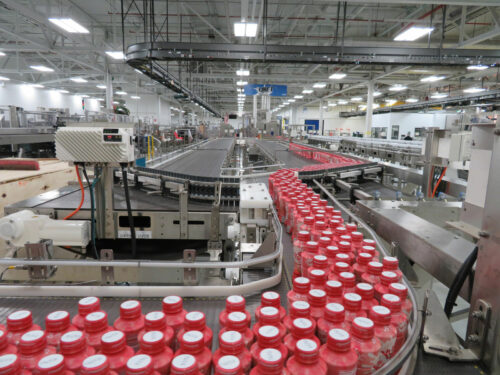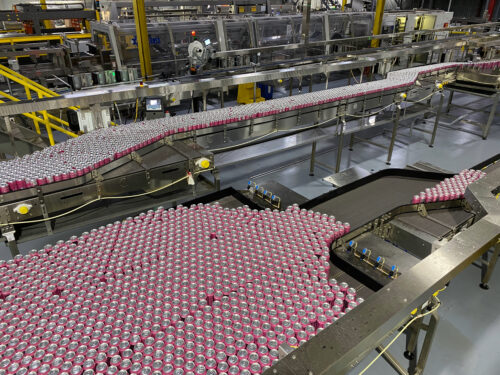Articles
3 Benefits of a Conveyor Audit for Food and Beverage Manufacturers

Is your conveyor system acting up? Looking for someone to help you solve your problems?
If this sounds like you, a conveyor audit will help you get your operations back up and running. As a manufacturer in the food and beverage industry, chances are conveyor systems are a large part of your operation. The food and beverage industry sees consistent growth in sales, meaning there is an increased need for conveyors that can keep up with the growing demand. Maintaining your conveyor systems to keep them in top condition is essential to remain competitive, prevent downtime, and maximize your profits. Whether you are looking for a solution to an existing problem or want to prevent one from occurring, a conveyor audit will help you diagnose and act on any food and beverage conveyor problems. In this article, we will explore the basics of conveyor auditing, what makes a good audit, some of the benefits, and the process of a conveyor audit. At the end, we will detail what comes after your audit.
What is a conveyor audit?
A conveyor audit is a thorough examination of a conveyor system to identify problems or areas for improvement. Audits are conducted to identify line upgrades or new equipment, technology, or upgrades that are needed. In the food and beverage manufacturing industry, maximizing profit and minimizing downtime is essential to remain competitive. With a conveyor audit, you can identify any issues with the mechanics or electrical components and review the overall performance of your system.
Experts in mechanical engineering and the food and beverage manufacturing industry inspect the conveyor belt, motors, rollers, gears, and control system, looking for signs of wear, misalignment, or malfunction. The specifics of your audit will depend on your initial concerns and the experience of our team. We may evaluate your system’s efficiency, capacity, and throughput to identify performance bottlenecks or inefficiencies. Or we may look at the components you are using and whether they are in line with current industry standards. This may include compliance or safety regulations.
The ultimate goal of a conveyor audit is to enhance your system either by solving an existing problem, recommending updates, or identifying potential future problems. Together, this improves the productivity of your operation and reduces the risk of costly downtime and repairs.
What makes a good audit?
When you are taking the time to either prevent or solve an existing problem, it’s important to get a high-quality conveyor audit. Here are key elements to consider for your conveyor audit.
Expertise and experience
Knowing you can trust the auditors reviewing your equipment or conveyor system is essential. You are entrusting not only your equipment but also your revenue to the company you choose. Your auditors should have a deep understanding and years of experience in conveyor systems for the food and beverage industry. This expertise ensures that they can accurately assess the system and provide relevant, actionable recommendations.
The Descon team is the conveyor packaging solution expert. We specialize in conveyors and equipment for the food and beverage industry. Our team has the knowledge and expertise to help you find and fix problems in your equipment and conveyors. As conveyor auditors doing multiple a year gives us the experience and knowledge to see patterns, look for flaws, identify the root cause of problems, and determine the life expectancy of your system.
Attention to detail
Precision is crucial in your conveyor audit. Your auditors will be looking for even the smallest details that might indicate a larger problem may develop. This will also help in identifying the root cause of any existing problems to create an action plan.’
In conveyor systems, even slight misalignments, cracks, or wear and tear can be indicators for an upgrade. Your auditor will be looking for those small details to ensure safety, smooth operation, and quality.
Practical recommendations & reporting
The purpose of your audit is to provide you with actionable information to make improvements, repairs, or maintenance for your conveyor system or equipment. When you have an expert conduct an audit, not only are you getting the facts about your system, but you should also have a clear understanding of how to take corrective action. Whether it be ordering and replacing parts or looking at an entirely new system, you should come out of an audit knowing what comes next, not questioning what to do.
All of the findings of your audit should be documented in a clear, understandable report that you can review and bring back to your team. This report should highlight issues, explain their potential impacts, and suggest corrective actions.
Ready for your audit? Contact Descon to schedule yours today!
3 Benefits of a Conveyor Audit
In the food and beverage manufacturing industry, maintaining your conveyor system and keeping up with the latest technology is critical to stay competitive. Auditing your conveyor system is a great way to take stock of your current operations and make necessary improvements. Here are three benefits of a conveyor audit:
- Optimized Material Handling: A conveyor audit will help you determine where there are problems or areas of concern in your line, allowing you to make adjustments. This optimization contributes to a more streamlined and effective material handling system.
- Preventative Planning: A conveyor audit provides insights into the age and condition of your equipment, allowing you to implement proactive and preventive maintenance measures. This may help mitigate unexpected breakdowns and downtime. Additionally, it will make your conveyor or equipment more reliable.
- Extended equipment lifespan: Auditing your equipment or conveyor system will allow you to address any issues and act promptly, preventing larger issues from occurring. Implementing proper maintenance practices and auditing can extend the lifespan of your equipment, reducing the need for frequent replacements or upgrades.
When do you need an audit?
There are many reasons manufacturers want to audit their conveyor systems or equipment. The most common reason is something is broken or not working correctly. However, you do not have to wait until something goes wrong for an audit to be worth it.

Fixing a problem
If you are experiencing downtime or a problem impacting your conveyor system, it is important to audit your system right away. By doing an audit at the first sign of trouble, you can prevent a larger problem and get your system back up and running.
Checking your conveyor health
Even if your conveyor system appears to be running smoothly, if you’ve had it for a while, an audit can help you ensure its longevity and efficiency. Your audit can prevent larger issues from occurring and may help you identify if an upgrade will boost your production. This strategic decision is to keep your conveyor system or equipment running smoothly, supporting an uninterrupted production process.
Maximize your potential
An audit is often overlooked as a means to maximize your revenue and productivity; however, we may be able to identify and suggest improvements. We can review your system’s capacity, speed, and efficiency, as well as your system layout, to determine if there are areas we can improve.
No matter your reason for wanting a conveyor audit, we know that you are looking to get the most out of your system and save money. We respect that, and we won’t recommend something we don’t truly believe is necessary. Sometimes, this means not upgrading to a new system. That is why your fully detailed report is so important so that we can work together to find a solution that is right for you.
Process of a conveyor audit
Once you contact us looking for a conveyor audit, we will ask questions about your reason for wanting an audit and your needs. We audit all of our Descon conveyors and equipment, as well as some additional conveyor systems. At this point, we have a good understanding of what you need coming out of this audit. We then move to reviewing your system.
To conduct the audit, we need to see your system running as well as downtime. Often, an audit takes two days to complete, with one day running and one day of downtime. We minimize the downtime because we know how important it is to have your equipment running. However, to get the best results, we need to inspect your conveyor system or equipment closely without it operating.

Once we have inspected your equipment or machine, we then take all of the information we’ve gathered back and create a report. In the report, we detail our findings and our recommendations for your system. In total, this process takes approximately a week to complete and deliver your report. Coming out of this, you can expect to have a better understanding of your conveyor system or equipment. Our audits may even determine that a repair is a better investment than an entirely new line.
What happens after your audit?
Once your audit is completed and we have identified the problem, the next steps will depend on our findings. Depending on the problem, we may suggest purchasing new parts or rebuilding an element of your system. We will also provide you with a completed report that details any issues and our suggestions for repairs.
With your audit report, you can take this back to your team and decide what actions you will take next, or you can get started and order parts right away. We also send a quote for any parts or replacement so that you can decide on the best path forward for your business.
A conveyor or equipment audit can be an incredibly powerful tool to help you solve an existing problem or prevent future problems. Going into an audit, you can expect minimal downtime and a quick turnaround for your report. Coming out of the audit, you will have a clear path forward, whether it’s buying new parts and fixing something small or a larger upgrade. Our goal is to make sure you have the best solution for your needs.
If you need or are interested in an audit of your conveyor system or equipment, contact us to get started!

Jack Prosa
Account Manager & Sales Engineer
Jack has worked at Descon for over 25 years, starting in mechanical engineering, and now uses his experience and expertise as an Account Manager and Sales Engineer.
